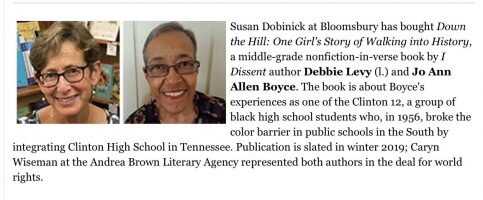A Manuscript, And A Heroine You Don't Know
Handing in a manuscript to an editor ahead of deadline--what a great feeling! That's what I did yesterday. (Did this act wipe out my feelings of discouragement about the day's news? No. But it did provide a respite.) And it occurred to me this morning that I've been so busy researching and writing, I haven't said a word about this book on my own website--not even when we announced it back in March! I'm correcting that lapse today.
The book, written with the dear and wonderful Jo Ann Allen Boyce, is titled Down The Hill: One Girl's Story of Walking into History. It's the story of Jo Ann's experience as one of the Clinton 12. The Clinton 12 were twelve black high school students who, in 1956, and in the face of sustained harassment and ugly violence, were among the first to desegregate a public school in the South. That school was Clinton High School in Tennessee.
In 1956, the events surrounding the desegregation of Clinton High School were splashed across the front pages of newspapers and magazines throughout the United States. The stories came into living rooms on the nightly television news. Eyes across America were on the little town of Clinton, Tennessee, and on Jo Ann and her classmates.
And yet today relatively few people know about what happened in Clinton. These events, so consequential in civil rights history and so widely known in their day, became lost to most of us. A year later, a vicious new desegregation crisis took place at Central High School in Little Rock, Arkansas. Three years after that, a poignant drama unfolded in New Orleans when little Ruby Bridges walked into William Frantz Elementary School. The nation's attention moved on, and the history books followed.
In Down The Hill, we're telling the story of what happened in Clinton from Jo Ann's point of view. She was a high school junior in 1956. I first got a glimpse of who she was as a 15-year-old when, on YouTube, I found Edward R. Murrow's "See It Now" CBS television news show that aired in January 1957 about the crisis in Clinton. There's Jo Ann on the screen, speaking with both frustration and patience about the struggle of being one of twelve black students at Clinton High School. This was one poised teenager.
I got additional glimpses of the teenage Jo Ann when I read newspaper interviews she gave during and after the Clinton crisis. Her comments to the Baltimore Afro-American in January 1957 were typical. The reporter asked Jo Ann to describe her experience in Clinton. "Let me tell you the good things first," the article reported her saying. Here, I thought, is a person with a heart as big as the movement she advanced. No wonder the headline of that story read "Jo Ann Allen, heroine of Clinton school fight."
Jo Ann and I connected in the spring of 2015, after her daughter-in-law, Libby Boyce, put a post about her and the Clinton 12 on Facebook, and my literary agent, Caryn Wiseman, brought it to my attention. We hit it off, and then proceeded to work for more than two years to produce our manuscript, going back and forth with long emails and longer telephone calls (we live across the country from each other); visiting Clinton, Tennessee, together, and the little museum there that's dedicated to the Clinton 12; sharing a milkshake at the drugstore luncheonette that barred Jo Ann and all black people from eating there when she lived in Clinton; visiting with two other members of the Clinton 12; working through the shape and scope of this book.
And now it's in our editor's hands. Before long, if all goes well, it'll be in yours.




